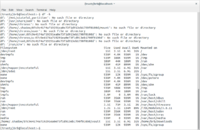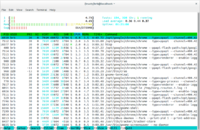Chrome: Difference between revisions
(→Useful) |
|||
| Line 299: | Line 299: | ||
The ChromeOS's Downloads folder is accessible in Ubuntu's ~/Downloads/ directory. | The ChromeOS's Downloads folder is accessible in Ubuntu's ~/Downloads/ directory. | ||
== Running servers in crouton == | |||
https://github.com/dnschneid/crouton/wiki/Running-servers-in-crouton | |||
= Manage Google Account = | = Manage Google Account = | ||
Revision as of 17:29, 20 May 2017
Chrome Extension
Launch
Launch an extension by keyboard shortcut
See this post. It works. Now I can use Ctrl+e to launch the Evernote clip extension.
Just head to chrome://extensions/ in your browser's address bar to open up the extensions page. Scroll down to the bottom and you'll see a Keyboard Shortcuts option. Click it, and you can set up custom shortcuts for some of you extensions.
List of all purchased
https://chrome.google.com/webstore/user/purchases
Most popular extensions and posts
2014
http://lifehacker.com/most-popular-chrome-extensions-and-posts-of-2014-1674273297
Useful
block ad trackers
User-Agent Switcher
https://chrome.google.com/webstore/detail/user-agent-switcher-for-c/djflhoibgkdhkhhcedjiklpkjnoahfmg
Silent Site Sound Blocker
Automatically mutes tabs that aren't your focus tab.
WikiWand (popular)
Magic Actions for youtube (extreme popular)
PageZipper, Page One and Re-Pagination (Firefox)
Painlessly merge a series of web pages into one
Behind the Overlay
Close any overlay on any website with a single click !
Online notepad
Imagus
Enlarge thumbnails, and show images/videos from links with a mouse hover.
Search Google Drive Directly from Chrome’s Address Bar
https://www.howtogeek.com/howto/32459/how-to-search-google-docs-from-the-chrome-location-bar/
Privacy badger
https://chrome.google.com/webstore/detail/privacy-badger/pkehgijcmpdhfbdbbnkijodmdjhbjlgp
How to View SSL Certificate Details in Chrome 56
Open Developer Tools -> Select the 'Security' Tab ->Select View Certificate.
ColorZilla
- Eyedropper
- Color picker
- Gradient generator
Common color names
- http://www.w3schools.com/colors/colors_names.asp
- http://www.colourlovers.com/blog/2007/07/24/32-common-color-names-for-easy-reference
Change color for better reading
Night reading mode
The good thing about it is we can choose the default to be ON or OFF. Some other extensions like 'Care your eyes' does not have this option.
The 'auto' mode changes depending on the time of a day (by default the night mode is enabled when it is 7pm-7am). There is no way to choose the night mode by websites.
Change Colors
Similar to above but we can select to apply based on a webpage or a domain. Seems to be more useful!
Deluminate
Similar to above.
Scroll to top or bottom
Scroll To Top Button by PoziWorld
How to Stop Websites From Asking For Your Location
https://www.howtogeek.com/howto/16404/how-to-disable-the-new-geolocation-feature-in-google-chrome/
Dashboard
Momentum
Access other cloud drives
Chrome Remote Desktop
Note that the standard Windows 8 version (non-Pro) cannot act as a Remote Desktop host. So a 3rd party solution like Chrome Remote Desktop or TeamViewer becomes more necessary.
Switch account
You Need These 5 Custom Chrome Browser Profiles
http://www.makeuseof.com/tag/custom-chrome-browser-profiles/
Profile Swapper
Read for us
SpeakIt!
Earth View from Google Maps
http://earthview.withgoogle.com/
Take a screenshot
http://www.howtogeek.com/223580/how-to-take-a-screenshot-on-your-chromebook/
Edit photos
Shell
Use Ctrl+Alt+t to open the crosh (Chrome OS developer shell). Thene type 'shell' to enter the regular shell. The Downloads folder is located under /home/chronos/user/Downloads/,
crosh> shell chronos@localhost / $ chronos@localhost / $ pwd / chronos@localhost / $ ls bin debugd dev etc home lib lib64 lost+found media mnt opt postinst proc root run sbin sys tmp usr var chronos@localhost / $ ls /home chronos root user chronos@localhost / $ cd /home/chronos/user/Downloads/ chronos@localhost / $ cd chronos@localhost ~ $ pwd /home/chronos/user
Chrome OS
- Customize your desktop such as adding an app to the task bar.
- https://simplychrome.com/category/chromeos/
Surprise Me wallpaper
https://productforums.google.com/forum/#!msg/chromebook-central/Imhld5eSqAA/sgcFjnOhBgAJ
Text editor
Crouton in Chrome OS
Like virtualization, chroots provide the guest OS with their own, segregated file system to run in, allowing applications to run in a different binary environment from the host OS. Unlike virtualization, you are not booting a second OS; instead, the guest OS is running using the Chromium OS system. The benefit to this is that there is zero speed penalty since everything is run natively, and you aren't wasting RAM to boot two OSes at the same time. The downside is that you must be running the correct chroot for your hardware, the software must be compatible with Chromium OS's kernel, and machine resources are inextricably tied between the host Chromium OS and the guest OS. What this means is that while the chroot cannot directly access files outside of its view, it can access all of your hardware devices, including the entire contents of memory.
To launch ubuntu next time, Ctrl + Alt+t to open a new tab, type 'shell' to enter a shell. Then type sudo startgnome. To exit ubuntu, pick 'log out' from the upper-right corner.
- https://github.com/dnschneid/crouton/blob/master/README.md
- http://www.howtogeek.com/162120/how-to-install-ubuntu-linux-on-your-chromebook-with-crouton/
- http://www.linux.com/learn/tutorials/795730-how-to-easily-install-ubuntu-on-chromebook-with-crouton
- Run Ubuntu in a Chrome browser tab
- http://pcworld.com/article/3187441/computers/how-to-install-linux-on-a-chromebook.html (5/1/2017)
Crosh shell and Bash shell
- 10+ Commands Included In Chrome OS’s Hidden Crosh Shell
- Poking around your Chrome OS Device
- Crouton Command Cheat Sheet
After we hit Ctrl+Alt+t, we will enter a crosh shell. Type shell to enter a bash shell.
Welcome to crosh, the Chrome OS developer shell. If you got here by mistake, don't panic! Just close this tab and carry on. Type 'help' for a list of commands. crosh> shell chronos@localhost / $ ls bin dev home lib64 media opt proc run sys usr debugd etc lib lost+found mnt postinst root sbin tmp var chronos@localhost / $ pwd / chronos@localhost / $ ls /home chronos root user chronos@localhost / $
Quick start
After we downloaded crouton, use ctrl+alt+t to open a new tab, type shell and Enter.
sh ~/Downloads/crouton
sh ~/Downloads/crouton -t help # show available targets
sh ~/Downloads/crouton -r list # show available linux distributions
sudo sh ~/Downloads/crouton -n trusty -u -t xorg
# trusty is the name of the chroot, xorg is a target; multiple targets separated by common is OK
sudo startunity
For reference purpose,
chronos@localhost / $ sh ~/Downloads/crouton
crouton [options] -t targets
crouton [options] -f backup_tarball
crouton [options] -d -f bootstrap_tarball
Constructs a chroot for running a more standard userspace alongside Chromium OS.
If run with -f, where the tarball is a backup previously made using edit-chroot,
the chroot is restored and relevant scripts installed.
If run with -d, a bootstrap tarball is created to speed up chroot creation in
the future. You can use bootstrap tarballs generated this way by passing them
to -f the next time you create a chroot with the same architecture and release.
crouton must be run as root unless -d is specified AND fakeroot is
installed AND /tmp is mounted exec and dev.
It is highly recommended to run this from a crosh shell (Ctrl+Alt+T), not VT2.
Options:
-a ARCH The architecture to prepare a new chroot or bootstrap for.
Default: autodetected for the current chroot or system.
-b Restore crouton scripts in PREFIX/bin, as required by the
chroots currently installed in PREFIX/chroots.
-d Downloads the bootstrap tarball but does not prepare the chroot.
-e Encrypt the chroot with ecryptfs using a passphrase.
If specified twice, prompt to change the encryption passphrase.
-f TARBALL The bootstrap or backup tarball to use, or to download to (-d).
When using an existing tarball, -a and -r are ignored.
-k KEYFILE File or directory to store the (encrypted) encryption keys in.
If unspecified, the keys will be stored in the chroot if doing a
first encryption, or auto-detected on existing chroots.
-m MIRROR Mirror to use for bootstrapping and package installation.
Default depends on the release chosen.
Can only be specified during chroot creation and forced updates
(-u -u). After installation, the mirror can be modified using
the distribution's recommended way.
-M MIRROR2 A secondary mirror, often used for security updates.
Can only be specified alongside -m.
-n NAME Name of the chroot. Default is the release name.
Cannot contain any slash (/).
-p PREFIX The root directory in which to install the bin and chroot
subdirectories and data.
Default: /usr/local, with /usr/local/chroots linked to
/mnt/stateful_partition/crouton/chroots.
-P PROXY Set an HTTP proxy for the chroot; effectively sets http_proxy.
Specify an empty string to remove a proxy when updating.
-r RELEASE Name of the distribution release. Default: precise,
or auto-detected if upgrading a chroot and -n is specified.
Specify 'help' or 'list' to print out recognized releases.
-t TARGETS Comma-separated list of environment targets to install.
Specify 'help' or 'list' to print out potential targets.
-T TARGETFILE Path to a custom target definition file that gets applied to
the chroot as if it were a target in the crouton bundle.
-u If the chroot exists, runs the preparation step again.
You can use this to install new targets or update old ones.
Passing this parameter twice will force an update even if the
specified release does not match the one already installed.
-V Prints the version of the installer to stdout.
Be aware that dev mode is inherently insecure, even if you have a strong
password in your chroot! Anyone can simply switch VTs and gain root access
unless you've permanently assigned a Chromium OS root password. Encrypted
chroots require you to set a Chromium OS root password, but are still only as
secure as the passphrases you assign to them.
Asus chromebox M075U
- Intel i3-4010U, 4K playback support, M2 SSD 2240
- F3 - refresh a web page
- Ctrl + D to enter a developer mode when we boot the chromebox
- Ctrl+Alt+t: open a shell in chrome browser.
- Type shell to open a shell.
- Type sudo startunity to open Ubuntu Desktop
- Ctrl+Alt+Shift+F1: Toggle Chrome OS and Ubuntu Desktop
Chinese character in gnome shell
It is related to locale. By default, it is
(trusty)brb@localhost:~$ locale LANG= LANGUAGE= LC_CTYPE="POSIX" LC_NUMERIC="POSIX" LC_TIME="POSIX" LC_COLLATE="POSIX" LC_MONETARY="POSIX" LC_MESSAGES="POSIX" LC_PAPER="POSIX" LC_NAME="POSIX" LC_ADDRESS="POSIX" LC_TELEPHONE="POSIX" LC_MEASUREMENT="POSIX" LC_IDENTIFICATION="POSIX" LC_ALL=
- http://tieba.baidu.com/p/2919742459?pn=2 Pay attention to the section 'Switch languages in crouton'.
Disk space
Test on my HP Chromebox CB1-014 Desktop (Intel Celeron 2955U Processor 1.4 GHz, 2GB DDR3, 16GB storage)
- The disk space returned from 'df -h' in Chrome OS (First).
- The disk space returned from 'df -h' in Ubuntu (Second)
- The system status returned from 'htop' in Ubuntu (Third)
Sharing files/directories
https://github.com/dnschneid/crouton/wiki/Sharing-files-and-folders
The ChromeOS's Downloads folder is accessible in Ubuntu's ~/Downloads/ directory.
Running servers in crouton
https://github.com/dnschneid/crouton/wiki/Running-servers-in-crouton
Manage Google Account
Use Google drive offline
Chrome Experiments
- Twitter Symbols: What Do @, d, RT, # Mean? and What Do Symbols Mean if Using Twitter?
- @: Talk publicly to another person
- d: Talk privately to another person
- #: Tag a message with a label. People use the hashtag to attach a theme or "tag" to their tweets, usually in connection with a trending or popular topic.
- Use These Great Twitter Tools to Manage Your Feed


